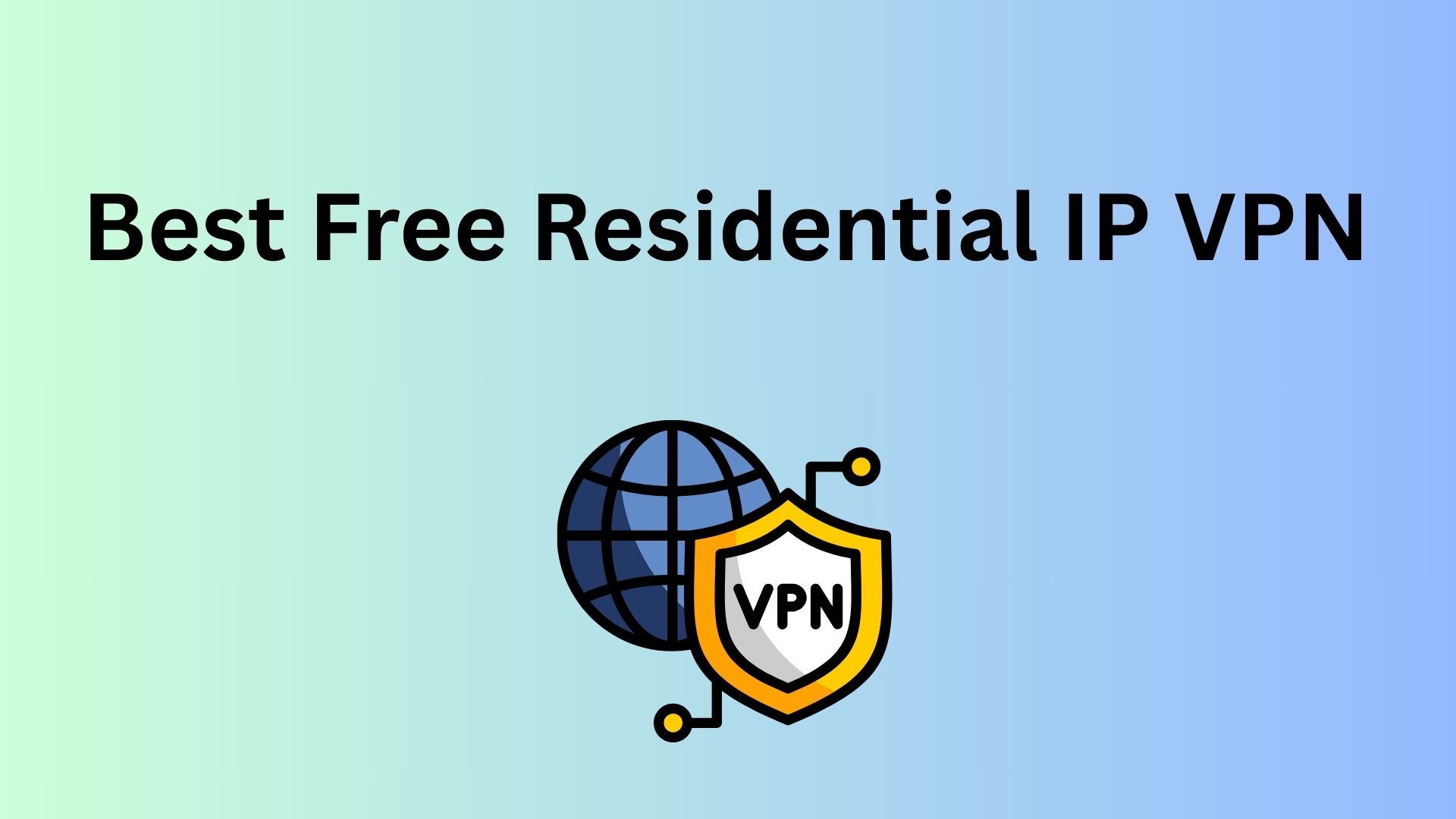Introduction
In an era where online privacy, security, and unrestricted access are paramount, Virtual Private Networks (VPNs) have become essential tools for internet users worldwide. Among the various types of VPNs, those offering residential IP addresses stand out for their ability to provide enhanced anonymity and bypass geo-restrictions effectively. But what if you’re on a budget? Can you find the best free residential IP VPN that meets your needs without compromising quality? In this comprehensive guide, we’ll explore what residential IP VPNs are, whether truly free options exist, and which providers offer the best solutions in 2025. We’ll also answer key questions like “Is there a 100% free VPN?” and “What free VPN can change my IP address?” while diving into features, advantages, disadvantages, and comparisons to help you make an informed choice.
What Is a Residential IP VPN, and Why Does It Matter?
A residential IP VPN is a type of VPN that routes your internet traffic through IP addresses assigned to real residential devices, such as home computers or routers, rather than data center servers. These IPs are registered with Internet Service Providers (ISPs) and tied to physical locations, making them appear as regular household connections. This distinction is crucial in 2025, as websites, streaming platforms, and online services increasingly use sophisticated detection methods to block traditional VPNs with data center IPs.
Why does this matter? Residential IPs offer a higher level of legitimacy and anonymity. They’re less likely to trigger CAPTCHAs, blacklists, or geo-restrictions, making them ideal for tasks like streaming, gaming, or accessing region-locked content. For tech enthusiasts and privacy-conscious users, finding the best free residential IP VPN can unlock these benefits without the cost of a premium subscription.
Is There a 100% Free VPN?
The short answer is yes, but with significant caveats. A “100% free VPN” refers to a service that requires no payment for basic access. However, truly free VPNs—especially those offering residential IPs—are rare and often come with limitations. Most free VPNs rely on data center IPs due to the high cost and complexity of maintaining a residential IP network. Additionally, free services may impose data caps, speed throttling, limited server locations, or even monetize your data through ads or tracking, undermining the privacy they promise.
In 2025, the VPN market has evolved, and while some providers offer free tiers, they typically reserve residential IPs for paid plans. So, while a 100% free VPN exists, finding one with residential IPs is a challenge we’ll explore further.
Are There Any VPN Providers Offering Residential IPs?
Yes, several VPN providers offer residential IPs, though most integrate them into premium plans rather than free versions. Residential IPs require a network of real devices or partnerships with users who share their bandwidth, making them resource-intensive. Here are some notable providers in 2025 that include residential IP options:
- NordVPN: Known for its vast server network, NordVPN offers dedicated IP options that mimic residential behavior, though these are paid add-ons.
- Surfshark: Provides dedicated IPs in select locations, blending residential-like functionality with affordability.
- Tuxler VPN: A lesser-known service that markets itself as a free residential VPN, leveraging a peer-to-peer (P2P) network of user-shared IPs.
While premium providers dominate the residential IP space, free options like Tuxler exist. However, their reliability, security, and transparency vary, which we’ll evaluate later.
What Free VPN Change My IP Address?
Virtually all VPNs—free or paid—can change your IP address by routing your traffic through their servers. The real question is whether a free VPN can provide a residential IP address for this purpose. Changing your IP to a residential one enhances your ability to blend in with regular traffic, avoiding detection by websites or services that block VPNs. Here are some free VPNs in 2025 that can change your IP, with notes on residential capabilities:
- Proton VPN: This offers a free tier with unlimited data but uses data center IPs, not residential ones.
- PrivadoVPN: A free plan with 10 GB of monthly data and servers in 13 locations, though residential IPs are reserved for paid users.
- Tuxler VPN: Claims to provide free residential IPs via its P2P network, making it a contender for changing your IP to a residential address.
For the best free residential IP VPN that changes your IP, Tuxler stands out, but its trade-offs warrant scrutiny.
Is There a 100% Free VPN Hide Me?
Hide.me is a reputable VPN provider known for its strong privacy features and no-logs policy. As of April 04, 2025, Hide.me offers a free tier, but it’s not “100% free” in the sense of unlimited access. The free plan includes 10 GB of monthly data, five server locations, and one simultaneous connection—adequate for light use but limited compared to premium plans. Importantly, Hide.me’s free version uses data center IPs, not residential ones. Residential IPs are available only in their paid tiers, starting at a modest price. So, while Hide.me provides a free VPN, it doesn’t meet the residential IP criterion in its free offering.
Top Free Residential IP VPNs in 2025
Based on current trends and available options as of April 04, 2025, here’s a curated list of the best free residential IP VPNs or those with free tiers that come close. Note that truly free residential IP VPNs are scarce, so we’ve included hybrid options with free trials or limited free plans.
1. Tuxler VPN
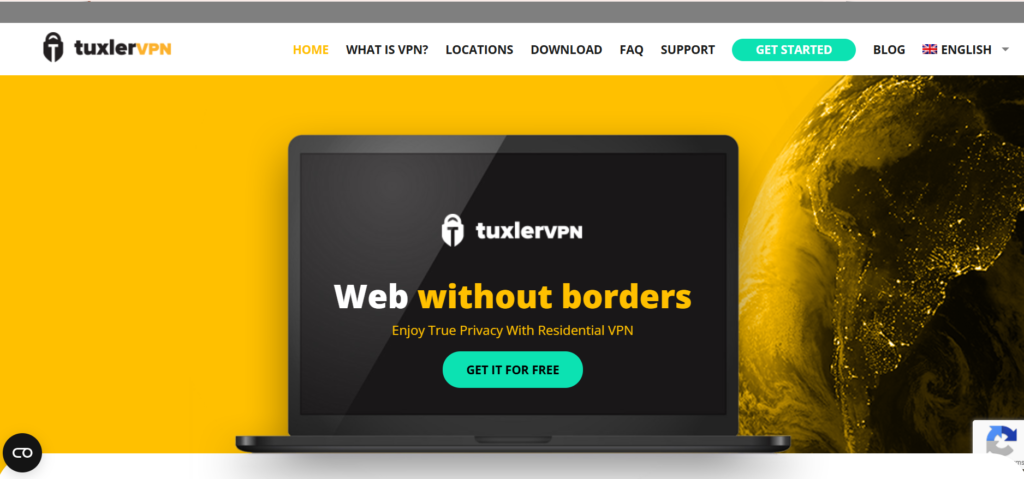
Image credits: tuxlervpn
- Features: Free access to a P2P network of residential IPs, covering numerous locations worldwide; basic encryption; no data cap.
- Advantages: Truly free with residential IPs; wide location coverage.
- Disadvantages: Limited transparency on security and logging; slower speeds due to P2P reliance; potential ethical concerns about IP sourcing.
- Best For: Casual users needing residential IPs for occasional browsing or bypassing geo-blocks.
2. Proton VPN (Free Tier)

Image credits: Protonvpn
- Features: Unlimited data, three server locations (US, Netherlands, Japan), AES-256 encryption, no-logs policy.
- Advantages: Robust privacy; no bandwidth limits; reliable performance.
- Disadvantages: Uses data center IPs, not residential; limited server options.
- Best For: Privacy-focused users willing to forgo residential IPs for a trusted free VPN.
3. PrivadoVPN (Free Tier)
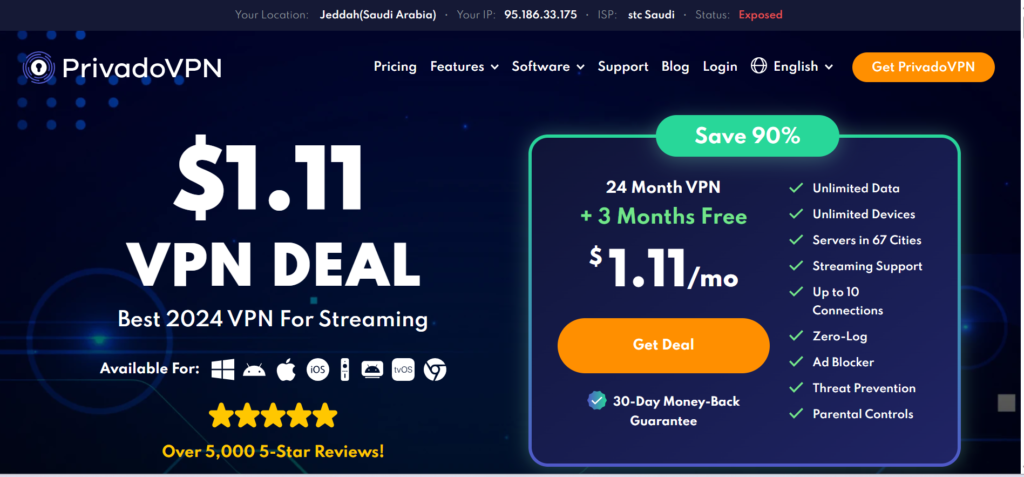
Image credits: PrivadoVPN
- Features: 10 GB monthly data, 13 server locations, kill switch, decent speeds.
- Advantages: User-friendly; good for streaming; solid security.
- Disadvantages: Data cap; no residential IPs in free plan (available in paid tiers).
- Best For: Streaming or light browsing with occasional IP changes.
4. Hide.me (Free Tier)
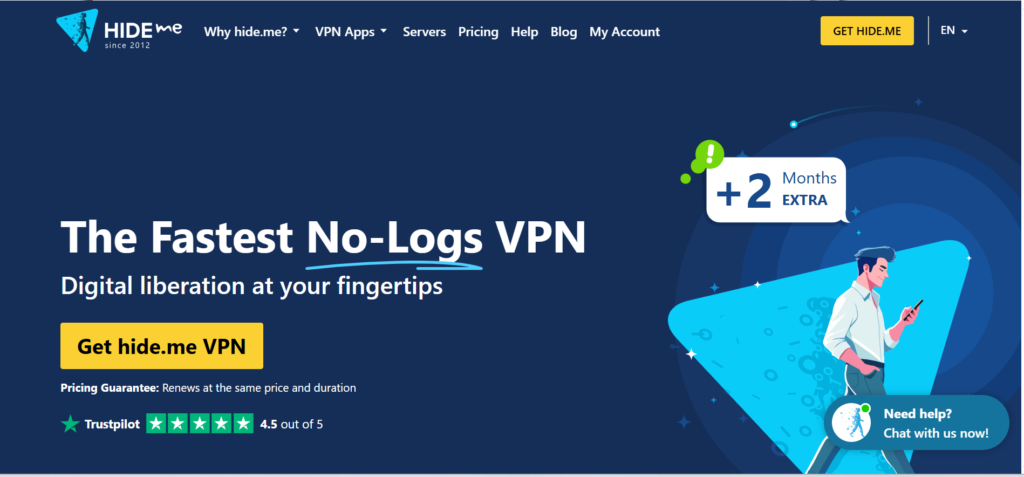
Image credits: Hide.me
- Features: 10 GB monthly data, five server locations, strong encryption, no-logs policy.
- Advantages: High privacy standards; easy to use.
- Disadvantages: Data center IPs only; limited free features.
- Best For: Security-conscious users testing a VPN before upgrading.
5. Windscribe (Free Tier)
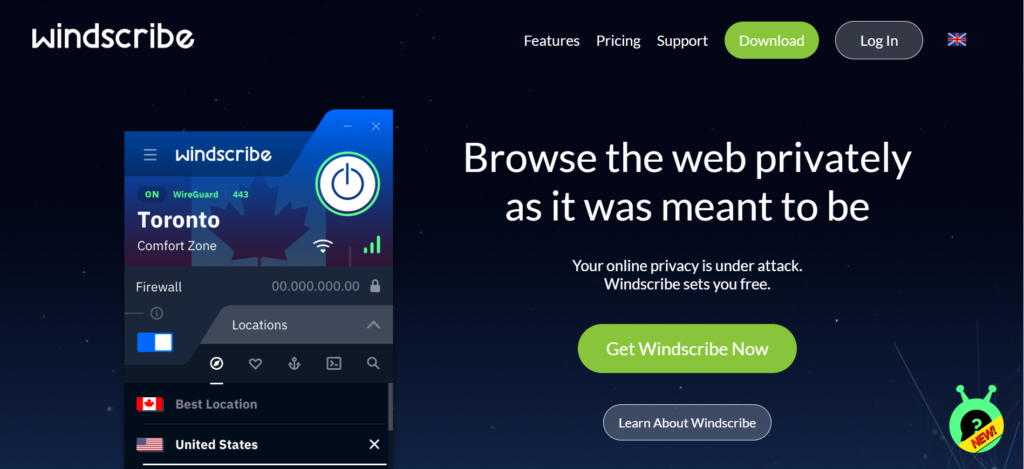
Image credits: Windscribe
- Features: 10 GB monthly data (with email signup), 11 server locations, firewall feature.
- Advantages: Generous free plan; good for bypassing restrictions.
- Disadvantages: No residential IPs; data limit restricts heavy use.
- Best For: Users needing a versatile free VPN with decent location options.
Advantages of Free Residential IP VPNs
- Enhanced Anonymity: Residential IPs mimic real user traffic, reducing detection by websites and services.
- Geo-Restriction Bypass: Ideal for accessing content on platforms like Netflix or BBC iPlayer that block data center IPs.
- Cost-Free Access: No subscription fees make them accessible to budget-conscious users.
- IP Flexibility: Changing your IP to a residential address can help with tasks like online shopping or gaming.
Disadvantages of Free Residential IP VPNs
- Performance Issues: Free services often suffer from slower speeds due to shared resources or limited infrastructure.
- Security Risks: Some free VPNs, especially P2P-based ones, may lack robust encryption or log user data.
- Limited Features: Data caps, fewer servers, and no residential IPs in many free tiers restrict functionality.
- Reliability Concerns: Free providers may not offer consistent uptime or support compared to paid alternatives.
Comparisons: Free Residential IP VPNs vs. Other VPN Types
Free Residential IP VPNs vs. Paid Residential VPNs
- Similarities: Both encrypt traffic and hide your IP; residential IPs improve anonymity.
- Differences: Paid VPNs (e.g., NordVPN, Surfshark) offer faster speeds, more server locations, and dedicated residential IPs, while free options like Tuxler rely on P2P networks with variable performance.
Free Residential IP VPNs vs. Datacenter VPNs
- Similarities: Both change your IP and secure your connection.
- Differences: Residential IPs are less likely to be blocked than data center IPs, which are commonly flagged by streaming services and websites. Datacenter VPNs (e.g., Proton VPN free) are faster but less anonymous.
Types of Residential IP VPNs
Residential IP VPNs come in various forms, each suited to different needs:
- Static Residential IPs: Fixed IPs assigned to one user, ideal for consistent access (e.g., remote work). Rarely free; typically a paid feature (e.g., NordVPN dedicated IPs).
- Dynamic Residential IPs: IPs that change with each connection, enhancing anonymity. Tuxler’s free P2P model often uses this approach.
- Shared Residential IPs: Multiple users share the same IP, reducing costs but also performance. Common in free or low-cost services.
Tips for Choosing the Best Free Residential IP VPN
- Prioritize Privacy: Look for no-logs policies and strong encryption (e.g., AES-256).
- Check IP Type: Confirm if the free tier offers residential IPs or just data center ones.
- Evaluate Limits: Assess data caps, server locations, and speed restrictions.
- Test for Streaming: Ensure it bypasses geo-restrictions on your preferred platforms.
- Research Reputation: Avoid providers with unclear practices or poor user reviews.
Conclusion: Finding the Best Free Residential IP VPN in 2025
The quest for the best free residential IP VPN in 2025 reveals a landscape of trade-offs. While 100% free VPNs like Tuxler offer residential IPs through innovative P2P networks, they come with risks like slower speeds and questionable transparency. Established free tiers from Proton VPN, PrivadoVPN, and Hide.me provide reliable alternatives but stick to data center IPs, limiting their residential appeal. For users needing residential IPs without compromise, paid options like NordVPN or Surfshark (with free trials or money-back guarantees) may be worth exploring.
Ultimately, your choice depends on your priorities privacy, streaming, or cost. For casual use with residential IPs, Tuxler is a standout free option. For robust security and performance, consider testing a premium VPN’s free trial. Whatever you choose, the best free residential IP VPN will empower you to navigate the digital world securely and freely in 2025.
FAQs
1. What Makes the Best Free Residential IP VPN Different from Other Free VPNs?
The best free residential IP VPN stands out because it uses IP addresses tied to real residential devices, not data center servers. Unlike typical free VPNs like Proton VPN or Windscribe, which rely on data center IPs, residential IP VPNs (e.g., Tuxler) mimic regular household connections. This makes them harder for websites or streaming services to detect and block, offering better anonymity and access to geo-restricted content in 2025.
2. Can a 100% Free VPN Provide Residential IPs in 2025?
Yes, but it’s rare. A 100% free VPN means no payment is required, and while options like Tuxler VPN offer residential IPs through a peer-to-peer network, most free VPNs (e.g., Hide.me, PrivadoVPN) use data center IPs instead. Residential IPs are costly to maintain, so truly free services with this feature often come with trade-offs like slower speeds or limited transparency, as noted in the 2025 VPN landscape.
3. Which Free VPN Can Change My IP Address to a Residential One?
Among free options in 2025, Tuxler VPN is a notable choice for changing your IP address to a residential one, thanks to its P2P network of user-shared IPs. Other free VPNs like Proton VPN and PrivadoVPN can change your IP address, but they use data center IPs, not residential ones. For the best free residential IP VPN experience, Tuxler is a contender, though its performance varies.
4. Is Hide.me a Good Option for a Free Residential IP VPN?
Hide.me offers a solid free tier with 10 GB of monthly data and strong privacy features, but it doesn’t provide residential IPs in its free plan as of April 04, 2025. Its free servers use data center IPs, while residential IPs are exclusive to paid plans. If you’re seeking the best free residential IP VPN, Hide.me falls short in this aspect, though it excels for general security and light use.
5. What Are the Risks of Using a Free Residential IP VPN?
Using a free residential IP VPN can come with downsides like slower speeds, as seen with Tuxler’s P2P model, or weaker security if encryption isn’t robust. Some free services might log your data or lack transparency, compromising privacy. Compared to paid alternatives, the best free residential IP VPN options in 2025 may also have data caps or fewer server locations, limiting their reliability for heavy users.

